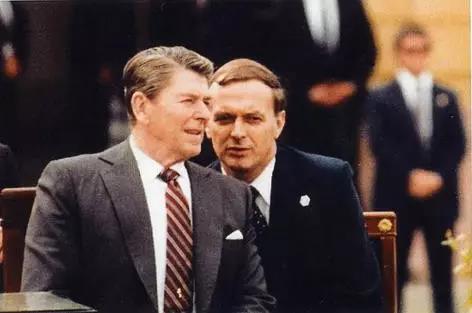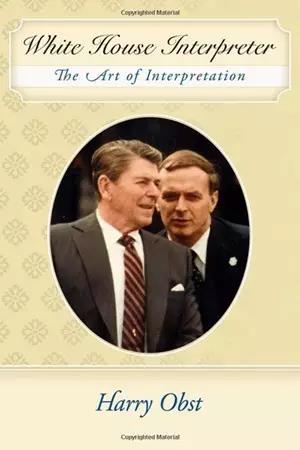给总统做翻译是什么样的体验?
译文内容简介
翻译之路充满坎坷,我们需要不断努力~~
在全世界各大重要会议或是领导人的私下会晤中,总有一些人坐在领导人身后,不间断将听到的信息翻译给自己的领导人,比如国内张璐,比如孙宁。美国也有这样一位总统背后的神级口译员——哈利·奥博斯特,在30年的口译生涯中,他曾先后为七位美国总统担任翻译。

美国前总统里根(左)和译员哈利·奥博斯特
给总统做翻译是什么样的体验?
By the time an interpreter gets into a room with the president and a foreign leader, he or she brings in more than simply past meetings. The first, essential foundation is a wide range of general knowledge. White House interpreters are provided by the Office of Language Services, which tests would-be interpreters on general knowledge.
等译员与总统和外国领导人走进屋子,他或她带来的不仅是以往参会的经验。首先,最基础的是广博的知识。白宫译员由语言服务处提供,服务处会就一般常识对译员进行测试。
“To work at the very top, you have to have an incredible arsenal of general knowledge, because the president will get into every damn topic you can imagine, from nuclear submarines to agriculture to treaty problems to labor problems to God knows what, jellyfish in the sea,” Obst says. “If you don’t know how an airplane flies, if you don’t know how a nuclear reactor works, you’re going to make mistakes.”
“在高层工作,你必须掌握大量的常识,因为总统会谈及你能想象到的每个该死的话题,从核潜艇到农业,从条约问题到劳工问题,甚至天知道,还有海里的水母,”奥博斯特说,“如果你不知道飞机是怎么飞的,不知道核反应堆如何工作,你就要出错。”
Like anyone else in a sensitive meeting, an interpreter must have high security clearance. He or she will also have received all the same briefing books as the president. That’s essential so that the interpreter can understand the nuances of the information discussed and knows the vocabulary. But it also means that the interpreter can serve as a crutch for the president, catching minor factual errors or slips of the tongue.
和所有其他参加敏感会议的人一样,译员必须通过严格的安全审查。他或她也和总统看一样的内部参考。这对译员很关键,他们要能理解所讨论信息的微妙之处,知道如何表达。但这也意味着译员可以成为总统的拐杖,发现小的事实性错误或口误。
Once in the meeting, typical protocol calls for a principal to speak, followed by an interpretation by his or her interpreter—so, for example, Trump would speak, and then his interpreter would pronounce what he said in Russian. That helps insulate the principal from factual errors, but it also helps avoid problems of idioms lost in translation. American presidents might be tempted to discuss “punting,” a football metaphor that would make little sense to a non-native English speaker; likewise, a European leader who referred to the “89th minute,” as in the final moments of a soccer game, would only confuse an American counterpart.
开会时,一般性礼节是发言人先说,译员再翻译,例如特朗普说话,然后译员用俄语再说一遍。这有助于把发言者的事实性错误滤掉,也有助于避免“迷失在翻译中”的用法问题。美国总统可能会说“踢空中球”,这一橄榄球用语对不说英语的人而言没什么意义;同样欧洲领袖可能会说“89分钟”,即足球比赛的最后时刻,这只会让美国大人物摸不着头脑。
“The interpreter will help the principal if he wants to be helped,” Obst says. “Usually you say, ‘Mr. Secretary, did you really mean to say such and such?’ Then he has a chance to correct himself. ”
“译员会帮助发言者,如果发言者需要的话,”奥博斯特说,“通常你会说,‘国务卿先生,你的意思是这样吗?’于是他就有机会改正。”
A figure like Trump, who sometimes mangles the English language and offers his own array of peculiar phrasings and usages (sad! bigly!) can present a different set of challenges for an interpreter.
像特朗普这样的人,有时会胡说一通,自造用法(sad! bigly!),这对译员而言着实是非同一般的挑战。
“People misspeak, and some very frequently, people like Alexander Haig,” Obst said, referring to the retired general who was chief of staff to Richard Nixon and secretary of state to Ronald Reagan. “He had a very crazy knowledge of the English language. He would not say what he really meant to say.”
“人们会辞不达意,有人经常如此,例如亚历山大·黑格,”奥博斯特说的是退休将军、理查德·尼克松的幕僚长和罗纳德·里根的国务卿黑格,“他会说的英语多极了,他说的话偏偏不是他要表达的。”
Not that interpreters are immune to making their own errors. Obst began working as an interpreter after just six months of training, and was helped out by the kindness of his more experienced counterparts.
译员自己也难免出错。奥博斯特接受了六个月的训练就开始做译员,很多更有经验前辈好心帮他提高。
“If I would make a minor mistake, they would just not react at all, because it was not important. If I would make a serious substantive mistake, they would stare at me and raise their eyebrows: Harry, you’ve just made a bad mistake. They give you a chance to look back into your memory and correct it yourself. If you can’t, you look back at them and shrug you shoulders: Help me!”
“我要是犯了个小错,他们压根不会吱声,因为那不重要。可要是犯了个实质性错误,他们就会盯着我,瞪大眼睛:哈利,你犯了个大错。他们给你机会回想一下,自己纠正过来。如果没办法纠正,你就看着他们,耸耸肩说:帮个忙吧!”
But Obst said he was lucky enough to avoid serious errors in his career. Interpreters who make a major gaffe tend to be quickly dismissed, he said.
可奥博斯特说他很幸运,职业生涯里没犯过大错。犯了大错的译员很快会被解雇。
Others become the story in other ways: Fred Burks was a talented linguist who resigned over complaints about secrecy in the Bush administration; he later testified on behalf of an accused terrorist in Indonesia, and now contributes to a conspiracy-theory website.
也有人以其他方式出名:弗莱德·博克斯是个很有天分的翻译,因对布什政府的保密规定感到不满而辞职,后来他在印尼代表一名被控为恐怖分子的人作证,现在建了一家阴谋论网站。
Those who stick around end up being the witnesses—though sworn to secrecy—to pivotal moments of history, likeGamal Helal, an Egyptian-born American who interpreted decades of Middle Eastern diplomacy between Arabic and English.
那些坚持下来的会成为关键历史时刻的见证者,尽管他们发誓保密。埃及出生的美国人贾马尔·希拉勒就是其中一员,他做英阿翻译几十年,见证了中东外交进程。
Interpreters also serve an essential role as record-keepers, taking notes that end up in the National Archives, Obst said. Of course, interpreters are not always asked to take notes.
译员还可以成为记录者,他们的笔记最后会保存在国家档案馆,奥博斯特说。当然,不是总允许译员做笔记。
Obst recalls that Nixon and Henry Kissinger, who distrusted the State Department and had a rocky relationship with Secretary William Rogers, sometimes kept U.S. interpreters out of meetings, for fear that they would brief Rogers on what had been discussed. (This also meant that Obst sometimes found himself assisting Rogers in conversations with foreign leaders on topics about which the White House had kept him in the dark.)
奥博斯特回忆起尼克松和亨利·基辛格,基辛格不信任国务院,和国务卿威廉·罗杰斯关系紧张,有时他们甚至不让美国译员参会,担心译员会向罗杰斯汇报讨论内容。(这也意味着奥博斯特有时要协助罗杰斯参与同外国领导人的对话,因为话题内容是白宫不想让他知道的。)
翻译之路充满坎坷
Harry Obst was born in East Prussia in 1932. He spent his early high school education as a refugee in Saxony under Soviet occupation. As the teaching of French and English was forbidden at that time, he learned English with the help of a small dictionary and eight copies of the Ladies Home Journal, the only English texts he could find. He enrolled at Mainz University in 1954, with no money, majoring in translation and rounding out his language studies.
哈利·奥博斯特于1932年出生在东普鲁士,早年以难民身份在苏联占领下的萨克森读高中。当时禁止教授法语和英语,在一部小字典和8份影印版《妇女家庭杂志》的帮助下他学会了英语,这些是他唯一能找到的英语材料。1954年,身无分文的奥博斯特进入美因茨大学,主修翻译专业,完成了语言学习。
Unable to find work as a professional translator, Obst emigrated to the United States in 1957. He worked in private industry for eight years until the Department of State offered him a staff position as diplomatic interpreter in 1965. He gained a thorough knowledge of the U.S. from 26 trips around the country as an escort interpreter for leading personalities from Europe and from his work with American presidents.
由于无法找到专职译员的工作,奥博斯特于1957年移民美国,在私企工作了8年,直到1965年美国国务院聘用他从事外交口译。作为美国总统和欧洲重要人物的陪同翻译,奥博斯特在全美游走过26次,这让他对美国有了全面了解。
著书分享翻译经历

His book, White House Interpreter: The Art of Interpretation, takes a look at five of the presidents from the interpreter's perspective: Johnson, Nixon, Ford, Carter, and Reagan. Most Americans have very little familiarity with professional interpreting, a profession known fairly well in Europe and Canada. After finishing WHITE HOUSE INTERPRETER, the reader will understand what interpreting is all about and why this profession is of considerable importance to many segments of our society: from the White House to the courthouse, from the military battlefield to our hospitals.
在《白宫译员:口译的艺术》一书中,奥博斯特从译员的角度对其中五位总统进行了描述:约翰逊、尼克松、福特、卡特和里根。大部分美国人并不像加拿大和欧洲那样熟悉职业口译,看完《白宫译员》后,读者就会了解口译是什么以及为何这个职业对我们社会的很多方面来说至关重要——从白宫到法院,从军事战场到医院。
The book is written for the general reader. The author avoids the linguistic jargon. He mixes the technical information with interesting anecdotes, many of them never published before.
该书是面向大众读者的,因此作者没有使用语言学术语,而是将技术性信息融入了趣闻轶事中,很多内容此前从未公开发表过。
[注:文章转载自公众号,其版权属于作者所有,如果涉及版权问题,请与我们联系admin@jooyee.com,谢谢!]



热门评论